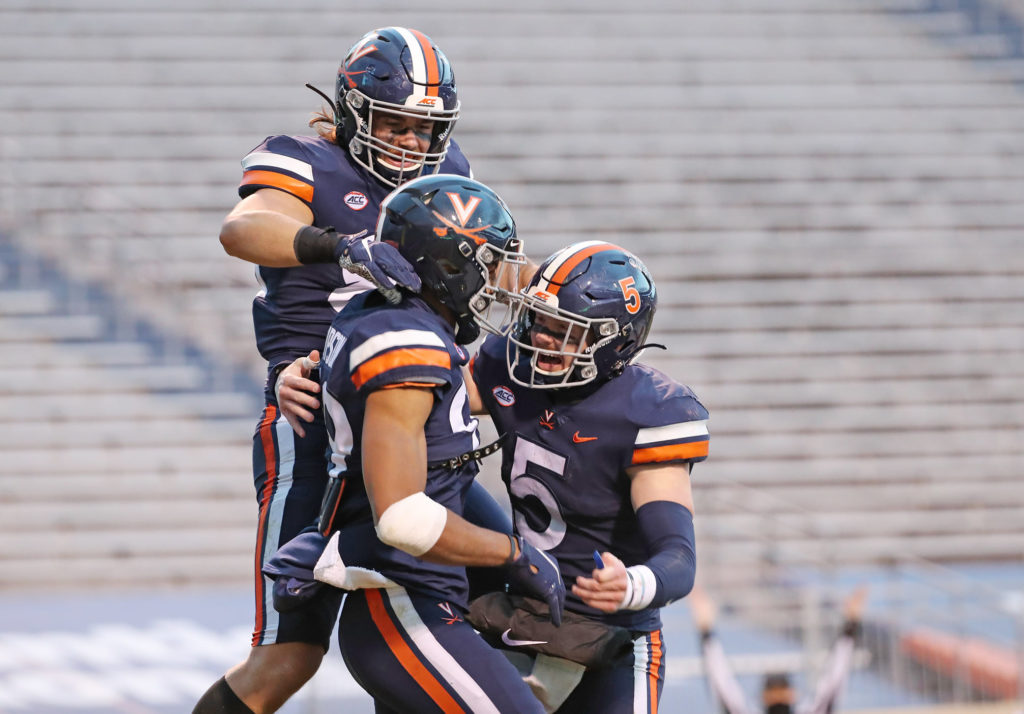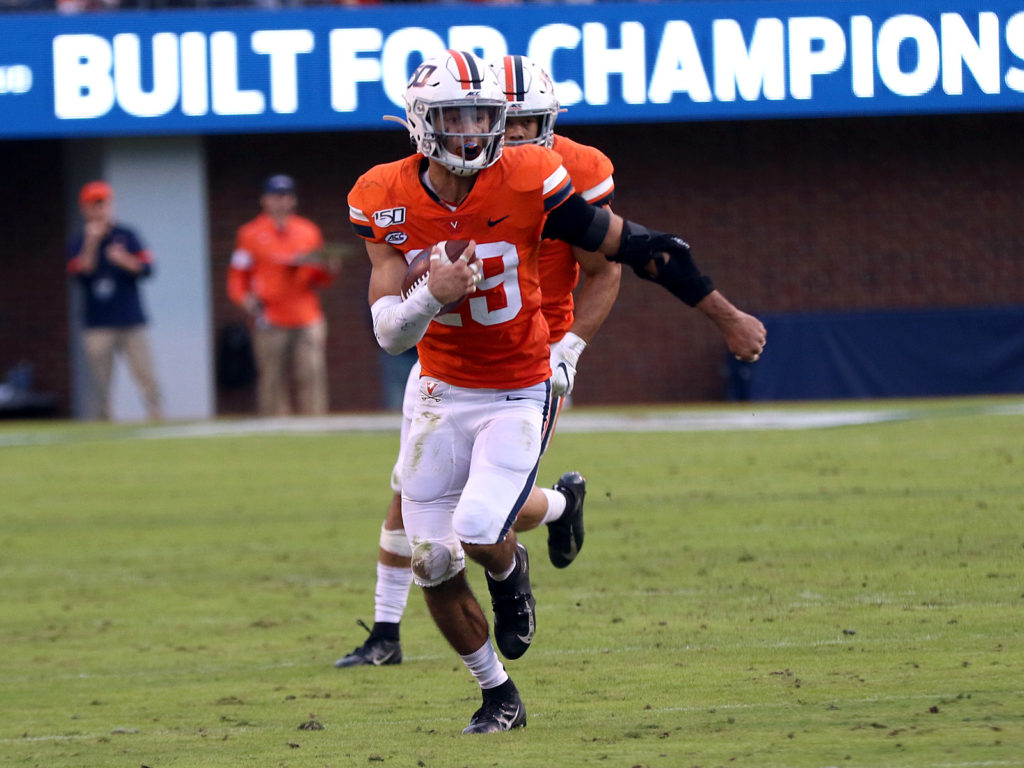
For the first time in 15 years, the University of Virginia football program experienced the joy of defeating arch-rival Virginia Tech. The Hoos took down the Hokies, 39-30, last season in Charlottesville. On the line this Saturday is the chance for UVA to beat Tech for a second straight season for the first time since 1997-1998.
Virginia heads into the 2020 Commonwealth Cup clash as winners of four straight games following last week’s home finale victory over Boston College. The Hoos used the same formula that resulted wins over North Carolina (October 31) and Louisville (November 14) – an explosive and opportunistic offense led by sophomore quarterback Brennan Armstrong, winning the turnover battle, and timely defense.
The Cavaliers are riding high after defeating the Eagles on Senior Day.
“I mean that was extremely special and this whole game was really special to at least the whole senior class, and everyone that came here,” senior defensive end Mandy Alonso said postgame. “It was just like a surreal moment. It was really special and this game was really going to define our season, and now we’re on to (Virginia) Tech, but just to appreciate this game. This was really good. It might make or break our season and we stood in defiance of that.”
“I’m proud of our team, the resiliency, determination and the progress they’re making,” Virginia head coach Bronco Mendenhall said. “I’m lucky to be their coach and anxious to take on our next challenge.”
Virginia Tech enters Saturday having lost four straight games, the latest a 45-10 home defeat to Clemson on December 5 that ensured the Hokies’ first losing regular season since 1992. Recapturing the Commonwealth Cup could salvage an otherwise disappointing year for the Tech (4-6), which won three of its first four to start the season.
The 2020 season has been an immense challenge for both programs because of coronavirus. Having a rivalry game, even without fans in the stands, is good motivation in what could be the final game of the season for both programs.
“I can’t speak and won’t speak for Virginia Tech, but I think one of the values of having a rivalry game at the end of the season is motivation,” Virginia football coach Bronco Mendenhall said. “And regardless of how your season is gone, there’s always that game. This year, maybe more than any, as you look around college football, I think there’s some teams that are just treading water and trying to make it to the finish. Others have something to look forward to and are excited for another opportunity because of a specific opponent. I think that’s what this type of game does for the players involved in college football.”
Essentials
- Location: Lane Stadium/Worsham Field – Blacksburg, VA
- Game Date: Saturday, December 12, 2020
- Game Time: 8 p.m.
- TV Info: ACC Network (More information)
- Radio Info: WINA 1070AM | TV/Radio Affiliates
- Live Game Tracker Stats
- Lane Stadium/Worsham Field Information
- UVA Official Notes and Stats – printable pdf
- Virginia Tech Notes and Stats – printable pdf
- Projected UVA Depth Chart – printable pdf
Three Opponents To Watch
Running Back Khalil Herbert, No. 21: Through 10 games last season, Virginia Tech totaled 1,788 yards rushing with 14 touchdowns, averaging 4.1 yards per carry. Through 10 games this season, the Hokies have racked up 2,389 yards with 25 touchdowns while churning out 5.6 yards per carry. Herbert, who has rushed for over 1,000 yards and is averaging 7.6 yards per carry, is a big reason for the improvement. In all nine of his performances (not including the Liberty game, where he was injured early on a kick return and did not return), the explosive Herbert has at least one double-digit rush. He has had at least one carry of 20+ yards in eight games and five games where he had at least one carry of 30 or more yards.
More than just a runner, the 5’9”, 212-pound Kansas graduate transfer leads all FBS players with 1,629 all-purpose yards, including 1,020 yards rushing, 430 yards on kick returns and 179 yards receiving. He has eight touchdowns in all, including seven on the ground.
Quarterback Hendon Hooker, No. 2: The junior signal caller has had a turnover in each of Virginia Tech’s last three games, tossing an interception against Miami, another interception at Pittsburgh, and a lost fumble (fumbled snap) that resulted in a defensive touchdown in Clemson’s 45-10 win over the Hokies last week. Still, Hooker is completing 65.3% of his passes this season and has become a bigger threat in the rushing attack, totaling 620 yards and nine touchdowns on 120 carries (5.2 YPC average).
As a runner, Hooker combines a 6’4”, 220-pound frame with the speed to break big plays. He and Herbert together in the backfield are a tough combination to account for. There was concern about his health last Saturday against Clemson, when he was seen shaking on the sidelines, but he reportedly is healthy and should be able to play against UVA.
Defensive End Amare Barno, No. 38: Barno caught my attention during Virginia Tech’s loss to Clemson last week. The 6’6”, 235-pound redshirt junior is a former linebacker who has moved down to the defensive line. He is rangy, has good speed, and most importantly makes plays. Barno leads all Virginia Tech defensive linemen in tackles with 37, leads the team in tackles for loss with 14 (five more than the next defender), and is second on the defense in sacks with 5.5. The South Carolina native also has two forced fumbles, two pass breakups, two quarterback hurries and one fumble recovery.
Other defenders I’m keeping an eye on:
Senior defensive tackle Jarrod Hewitt (No. 5), who has 7.5 tackles for loss including 4.5 sacks and could give UVA center Olusegun Oluwatimi problems in terms of pass rush. Oluwatimi has struggled with pass protection most of this season, receiving a 50.9 grade from Pro Football Focus in that area.
Defensive back Chamarri Conner (No. 22), a two-time ACC Defensive Back of the Week who is consistently in the thick of the action. Conner leads Virginia Tech in tackles with 76.
Three Quotes
Bronco Mendenhall on Virginia Tech’s offense: “Much like every year under Coach Fuente, Virginia Tech is hardnosed. They’re run first. They’re physical. They’re tough. They play aggressively. The scheme builds on each other. There’s great screens and play actions and RPOS and then just good personnel. And so, it’s just very well designed. It’s very well architected and it’s usually really well executed. The quarterback position is one of the critical pieces for that. And every year it seems like there’s not only one but two, possibly three and sometimes even four players that are capable of that position. When you run the quarterback as we do and as they do, there’s risk, and so the next player up or the next man up is critical. And, and I’m impressed with whoever’s playing that spot for Virginia Tech. I just think they’re really well coached and well designed.”
The Tech offensive line is “really well coached. They execute at a high level. The schemes are stressful on a defense. And there’s a good running back and a good running quarterback. So all those variables right lead to just the production they’re having.”

Virginia safety Joey Blount on what it would mean to end this regular season (and potentially his college career) with a win at Virginia Tech: “It’s a big deal. Last time I was at Blacksburg it was an experience I won’t forget. You know, their crowd was intense. Wrapping up with this final win and at Blacksburg would just add more to the story of the team. We’ve been working so hard every game and working so hard with the protocols and following what our medical staff is talking about and preaching to us. Coming through the season it has been ups and downs a lot, and to finish out with a potential win in Blacksburg would add to the story.”
Virginia Tech defensive end Jarrod Hewitt on last year’s loss to the Hoos: “It ultimately came down to they had more energy that day and they wanted to win it more. That’s been something that’s eaten at us the last whole year. When Coach Fuente brings it up in a team meeting, he shows examples of how they did play harder than us. It enrages us. You’re disappointed that we let that happen last year, and as a senior this year, it’s not going to happen under my watch. There’s no way they can play harder than we can play in our stadium. It just can’t happen.”
Three Key Questions
1. Who will/won’t play?
Virginia has been largely unaffected when it comes to players missing games due to COVID-19. As the country has seen an uptick in positive cases, though, so has the Virginia athletics program. UVA men’s basketball announced it was putting all activities on pause because of the coronavirus, and last week UVA football had six players out due to coronavirus. Although no specific reason was given for their absence, linebacker Noah Taylor and defensive tackle Jahmeer Carter did not play in the Boston College win.
Virginia defensive coordinator Nick Howell said Taylor and Carter practiced with the team on Wednesday (December 9), so it appears they will play versus Tech. But with the uptick in cases we will keep a close watch to see the COVID-19 test results report ahead of kickoff. UVA remains razor thin depth-wise at certain positions such as defensive line and safety because of injuries, so a further hit because of COVID-19 could have a major impact.
Other injuries of note:
– Howell says starting safety Brenton Nelson will be out versus Virginia Tech. He has missed the last five games because of injury.
– Virginia true freshman wide receiver Lavel Davis Jr. has been practicing, offensive coordinator Robert Anae said. Davis Jr. left the BC game after taking a hit to the back of the helmet.
– Virginia Tech star wide receiver Tre Turner missed last Saturday’s game versus Clemson. If he can play against Virginia, Turner, who leads his team in receiving yards, gives Tech’s passing game a big boost against a suspect Virginia secondary. Turner had seven receptions for 134 yards and a 61-yard touchdown against the Hoos last season.
2. Will Virginia be able to slow down the Tech rushing attack?
With a talented and physical offensive line leading the way, Virginia Tech has shown it can be a dominant rushing team in 2020. The Hokies are averaging 238.9 yards rushing per game. Meanwhile, UVA is allowing an average of 125.9 yards per contest and just held Boston College to -7 yards.
This will be a matchup of strengths. Virginia probably won’t be able to stop the Hokies, but the Hoos must slow down the Tech rush offense. If Tech can get the ground game going early, the concern is two-fold: Tech’s passing attack opens up and a thin Virginia defensive line could wear down over the course of the game.
3. Who will win the turnover battle?
A plus turnover margin has played a major role in the Hoos’ resurgence this season. UVA had one turnover while forcing two against UNC, a victory that turned the Hoos’ season around. UVA had two turnovers while forcing three against Louisville, and last week the Hoos had one turnover to BC’s three. Just as important, the Hoos have converted the majority of those takeaways into touchdowns, helping offset a shaky defense that has surrendered a lot of yards and big plays.
Virginia Tech has 13 turnovers in 10 games, three of which came against Clemson, so the Hokies have done a solid job of taking care of the football for the most part. Meanwhile, the Hokies have forced 15 turnovers. This includes 10 interceptions, three of which have been by senior safety Divine Deablo. UVA signal caller Brennan Armstrong tossed six picks in the Cavaliers first three games but has 11 touchdowns and three picks in the past five games since returning from a concussion. In addition, Armstrong’s completion percentage has improved in each of the past five outings.
Turnovers have been huge in the past two Commonwealth Cup contests. UVA forced three Virginia Tech turnovers and surrendered only one in last year’s victory in Scott Stadium. The previous year, Virginia Tech had three takeaways to UVA’s two. The final turnover was a Bryce Perkins fumble that sealed Tech’s 34-31 victory in overtime.
Picks
Sabre Editor Kris Wright
Well, here we are. Commonwealth Cup rivalry week showdown with Virginia Tech. UVA, of course, snapped the streak last season with a win in Charlottesville so the pressure is gone in that sense, but the Hoos haven’t won in Blacksburg since 1998 and haven’t won back-to-back games in the series since that game followed a win in 1997. That’s obviously a long time.
This year offers an opportunity. The Hokies have lost 4 straight games and 5 of their last 6. They’ll finish with a regular season losing record for the first time since 1992. The Cavaliers, meanwhile, have won 4 straight games and have secured at least a .500 record in the regular season. There will be no Lane Stadium crowd this year due to the pandemic.
So what will decide this one? Other than turnovers, the key almost any week, this looks like a game where winning the running battle and limiting big plays the best could be decisive. Virginia Tech runs the ball on almost 2/3 of its plays and averages 238.9 rushing yards per game (11th). The Cavalier defense allows just 125.9 rushing yards per game (26th nationally). That’s strength on strength. On the flipside, Virginia averages 174.7 rushing yards per game (59th nationally), while the Hokies’ defense allows 194.1 rushing yards per game (96th nationally). That’s a moderate edge and potentially a big one if Brennan Armstrong and Keytaon Thompson get going as the VT defense has shown some issues against mobile QBs over the years. In terms of big plays, VT is 98th nationally (46) and UVA is 122nd nationally (63) in opponent plays of 20+ yards. Both are top 50 in producing big plays – the Hokies are 14th (55 20+ plays) and the Hoos are 48th (39 20+ plays).
If the signs are pointing to a high-scoring game potentially, the edge goes to Virginia. The Wahoos have 31 or more in their last four games and 40+ in three, while the Hokies have 24 or fewer points in four of their last six and 16 or fewer in three. The Hoos keep the cup. UVA 41, VT 31 This season: 7-2.
Sabre Associate Editor Chris Horne
Although there is just one game remaining, Virginia is gaining confidence. Quarterback Brennan Armstrong and the offense is clicking, and the Hoos are putting up points while making just enough plays on defense to keep the opposition at bay. The Cavalier offense was in control against Boston College last week, making plays through the air and on the ground.
Despite its first losing regular season since 1992 and Justin Fuente rumored to be on the hot seat, I expect Virginia Tech to be motivated to play UVA and regain the Commonwealth Cup. There is still a lot of pride in the Hokies, who played with passion against Clemson before the Tigers were able to pull away in the second half. The defense in particular played the Tigers physical and fared well through the first two quarters.
Virginia Tech’s offensive line and running game will be a big challenge facing a thin Virginia defense, but Armstrong and the Virginia offense will be a challenge for a Tech defense that has surrendered an average of 460 yards and 33 points per game. The last two games in this series were exciting, back-and-forth contests, and I expect the same on Saturday.
UVA records the close win it should have gotten in 2018 and claims the Cup for a second straight year. VIRGINIA 31, VIRGINIA TECH 27 This season: 6-3.
Remember When …
Jubilation!



